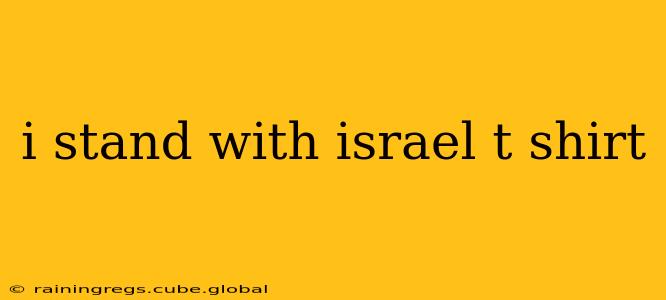I Stand With Israel: Understanding the T-Shirt and the Movement
The simple phrase "I Stand With Israel" emblazoned on a t-shirt represents a complex and multifaceted issue. It's a declaration of support for the State of Israel, but the meaning and implications of that support vary widely depending on individual perspectives and understanding of the Israeli-Palestinian conflict. This shirt, and the movement it represents, deserves a deeper look. We'll explore the reasons people wear these shirts, the criticisms levied against them, and the broader context of the Israeli-Palestinian conflict.
What does "I Stand With Israel" mean?
For many, wearing an "I Stand With Israel" t-shirt signifies solidarity with the Jewish state, its people, and its right to exist. This support can stem from various sources: a strong belief in Zionism, religious conviction, a personal connection to Israel or its people, or a concern for Israel's security in a volatile region. Supporters often point to Israel's democratic institutions, technological advancements, and contributions to the arts and culture as reasons for their support. It's important to note that support for Israel doesn't automatically equate to approval of every Israeli government policy or action.
Why do people wear "I Stand With Israel" shirts?
The reasons are multifaceted and personal. Some wear the shirt as a public declaration of their Jewish identity and pride in their heritage. Others see it as a way to counter what they perceive as unfair criticism or bias against Israel in the media or academic circles. Still others wear it as a symbol of support for Israel's right to self-defense in the face of ongoing conflict. It's a way to express their beliefs and affiliations publicly and participate in a broader movement.
What are the criticisms of the "I Stand With Israel" movement?
The "I Stand With Israel" movement, while expressing support for the state, often faces criticism for being perceived as overly simplistic, neglecting the Palestinian perspective, and even implicitly condoning actions considered unjust or harmful. Critics argue that the phrase often overshadows the complexities of the conflict and ignores the suffering of Palestinians. Some view it as a silencing tactic that prevents open discussion and critical examination of Israeli policies. The perceived lack of nuance is a key point of contention.
Is "I Stand With Israel" inherently political?
Absolutely. The phrase and the act of wearing the shirt are unequivocally political statements. The Israeli-Palestinian conflict is a deeply political issue with significant historical, religious, and geopolitical dimensions. There is no neutral stance on the matter; choosing to wear the shirt is a direct participation in the ongoing political debate.
What are alternative perspectives on the conflict?
Understanding the conflict requires exploring perspectives beyond the "I Stand With Israel" narrative. This includes recognizing the Palestinian narrative, their history of displacement, and their ongoing struggle for self-determination and statehood. Numerous organizations and individuals offer alternative perspectives that are essential to a comprehensive understanding of the conflict's complexities. These alternative viewpoints often highlight the humanitarian crisis and the need for a just and lasting peace solution that addresses the needs of both Israelis and Palestinians.
In conclusion, the "I Stand With Israel" t-shirt is more than just clothing; it's a symbol deeply rooted in a complex and often contentious political landscape. Understanding the nuances of this movement requires examining both its supporters' motivations and the criticisms it faces. A balanced understanding necessitates engaging with a wider range of perspectives on the Israeli-Palestinian conflict.
